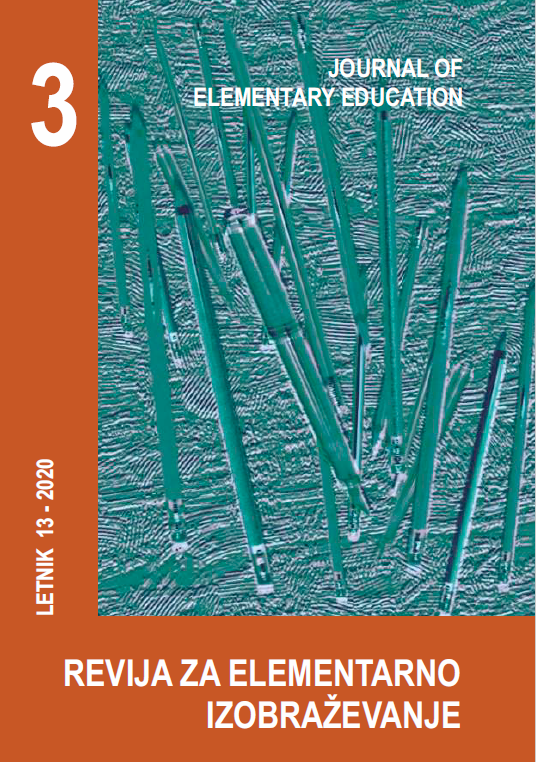European identity and multilingualism
DOI:
https://doi.org/10.18690/rei.13.3.243-260.2020Keywords:
učenje, okolje, učna učinkovitost, učenci, spremenljivkeAbstract
In the official documents that regulate certain segments of education in Croatia, the terms Europe and European (identity) appear. In this paper the authors analyse the concept of European identity and reach
the conclusion that it has not been unambiguously defined. The term European identity is closely connected within the European Union with multilingualism. Through a policy of multilingualism, the European Union
strives to preserve language diversity in Europe. The authors of this paper start from the question of whether foreign language learning increases the feeling of being connected to Europe and present the results of a study that was conducted at the Faculty of Teacher Education in Zagreb in 2018/19.
Downloads
References
Aladrović Slovaček, K. & Čosić, G. (2017). Jezična kompetentnost i osviještenost budućih učitelja. In: D. Stolac and A. Vlastelić, (Ed.) Jezik kao predmet proučavanja i jezik kao predmet poučavanja (pp. 17–29). Rijeka: HDPL i Srednja Europa.
Bulletin of the European Communities (1973). December, No 12, Luxembourg: Office for Official Publications of the European Communities, 118–122.
Brubaker, R. & Cooper, F. (2000). Beyond ‘identity’. Theory and Society 29, 1–47.
Byram, M. & Planet, M. T. (2000). Social Identity and the European Dimension: Intercultural Competence through Foreign Language Learning. Strasbourg: Council of Europe Publishing.
Cerutti, F. (2001). Towards the Political Identity of the Europeans, In: F. Cerutti & R. Enno (Eds.), A Soul for Europe, Volume 1: On the Political and Cultural Identity of the Europeans. A Reader. Leuven: Peeters.
Cifrić, I. & Nikodem, K. (2007). Relacijski identiteti. Socijalni identitet i relacijske dimenzije. Društvena istraživanja, 16(3), 331–358.
Cifrić, I. (Ed.). (2008). Relacijski identiteti. Prilog istraživanju identiteta hrvatskog društva. Zagreb: Hrvatsko sociološko društvo i Zavod za sociologiju Odsjeka za sociologiju Filozofskog fakulteta u Zagrebu.
Cjelovita kurikularna reforma. Rani predškolski, osnovnoškolski i srednjoškolski odgoj i obrazovanje (2016). Nacionalni kurikulum nastavnoga predmeta Engleski jezik – prijedlog.
Cjelovita kurikularna reforma. Rani predškolski, osnovnoškolski i srednjoškolski odgoj i obrazovanje (2016). Nacionalni kurikulum nastavnoga predmeta Njemački jezik – prijedlog.
Dahrendorf, R. (2003). Making Sense of the EU. The Challenge for Democracy. Journal of Democracy 14(4), 101–114.
Däuble, H. (2004). Die Identität des alten Kontinents ist im Fluss. Das Parlament 54(21/22).
Eberstadt, M. & Kuznetsov, C. (2008). Bildung und Identität. Möglichkeiten und Grenzen eines schulischen Beitrags zur europäischen Identitätsentwicklung. Frankfurt am Main: Peter Lang.
European Commission, Press release Database. (2005). IP/05/1451, Brussels, 22 November 2005. Available at: http://europa.eu/rapid/press-release_IP-05-1451_en.htm [23.05.2019.]
Grundmann, M. (1999). Konstruktivistische Sozialisationsforschung: Lebensweltliche Erfahrungskontexte, individuelle Handlungskompetenzen und die Konstruktion von sozialer Strukturen, Frankfurt a. M.: Suhrkamp.
Herder, J. G. (1986). Abhandlung über den Ursprung der Sprache. Stuttgart: Reclam.
Humboldt, W. von. (1973). Über den Dualis. In: Humboldt, Wilhelm von, Schriften zur Sprache (ed. Michael Böhler). Stuttgart: Reclam.
Humboldt, W. von. (2010). O raznolikosti gradbe ljudskih jezika i njezinu utjecaju na duhovni razvoj čovječanstva. Zagreb: Alfa.
Jamieson, L. (2002). Theorizing Identity, Nationality and Citizenship: Implications for European Citizenship Identity. Slovak Sociological Review 34(6), 507–532.
Kalanj, R. (2010). Identitet i politika identiteta (politički identitet). In: N. Budak & V. Katunarić (eds.). Hrvatski nacionalni identitet u globalizirajućem svijetu. Zagreb: Centar za demokraciju i pravo Miko Tripalo, Pravni fakultet, 117–133.
Laffan, B. (2001). The European Union polity: a union of regulative, normative and cognitive pillars. Journal of European Public Policy 8(5), 709–727.
Lepsius, R. M. (2002). Bildet sich eine kulturelle Identität in der Europäischen Union? Blätter für deutsche und internationale Politik 8, 948–955.
Limbach, J. & Gerhards, J. (2012). Europäische Sprachenpolitik. Aus Politik und Zeitgeschichte 4, 48 – 57.
McGuire, W. J., McGuire, C.V. & Cheever, J. (1986). The self in society: Effects of social context on the sense of self. British Journal of Social Psychology 25, 259–270.
Ministarstvo znanosti, obrazovanja i športa RH (2006). Nastavni plan i program za osnovnu školu. Zagreb: Ministarstvo znanosti, obrazovanja i športa RH.
Ministarstvo znanosti, obrazovanja i sporta (2012). Kurikulum građanskog odgoja i obrazovanja. Zagreb: Republika Hrvatska, Ministarstvo znanosti, obrazovanja i sporta/Agencija za odgoj i obrazovanje
Nissen, S. (2004). Europäische Identität und die Zukunft Europas. APuZ 38, 21–29.
Pavić, R. (2009). Što je Europa, ili – pitanje identiteta. Anali Hrvatskog politološkog društva 5(1), 509–519.
Pollak, J. (1998). Zur politischen Identität der europäischen Staatengemeinschaft. Frankfurt a. M.: Lang.
Službeni list Europske unije, Hrvatsko izdanje (2016). Ugovor u Europskoj uniji (pročišćena verzija), C 202/sv. 59, 3–45.
Schmid, K. (1990). Europa zwischen Ideologie und Verwirklichung. Psychologische Aspekte der europäischen Integration. Schaffhausen: Novalis Verlag.
Swaan, A. de (2007). The Language Predicament of the EU since the Enlargements. Sociolinguistica, 21, 1–21.
Swaan, A. de (2001). Words of the World. Cambridge: Polity Press.
Tibi, B. (2002). Europa ohne Identität? Leitkultur oder Wertebeliebigkeit. München: Bertelsmann Verlag.
Velički, D. (2007). Nova višejezičnost i učenje stranih jezika kao dio jezične politike. Metodički ogledi 25. Zagreb: Hrvatsko filozofsko društvo, 93–103.
Velički, D. & Šenjug, A. (2010). Učenje demokracije i demokratske kompetenciije budućih odgojitelja i učitelja. Napredak: časopis za pedagogijsku teoriju i praksu 151(3-4), 390–406.
Velički, D. (2018). Civic Education in the Republic of Croatia – Familiarity with the Institutions of the European Union among Students of the Faculty of Teacher Education. Conference Proceedings The Future of Education. 8th Conference Edition, libreriauniversitaria.it edizioni, 544–549.
Vrcan, S. (2005). Europski identitet – neke ključne dileme. Revija za sociologiju 36(1–2), 7–21.
Zimmermann, A. (2010). Die Identitätspolitik der Europäischen Union. Ausgearbeitete Fassung des Vortrags vom Symposium Europa – ein „christlicher“ Kontinent? Das Verhältnis der politischen, kulturellen und religiösen
Dimensionen des europäischen Integrationsprojekts. München: Voegelin Zentrum für Politik, Religion und Kultur des Geschwister-Scholl-Instituts für Politikwissenschaft an der Ludwig-Maximilians-Universität München.
Downloads
Published
Issue
Section
License
Copyright (c) 2020 Jerneja Herzog

This work is licensed under a Creative Commons Attribution 4.0 International License.
